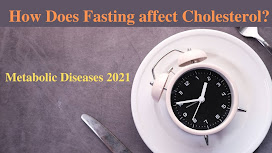How Does Fasting affect Cholesterol?
Cholesterol
is a fatty substance produced by the body and found in a variety of foods.
While your body need some cholesterol to function properly, too much
cholesterol, or excessive cholesterol, increases your risk of heart
attack or stroke.
The researchers
determined that a 24-hour water-only fast raised both LDL and HDL cholesterol,
resulting in an abrupt increase in total blood cholesterol. Fasting caused
changes in lipids, weight, and glucose levels, among other risk factors.
Human growth hormone
levels increased by roughly 1300 percent in women and 2000 percent in men. One
of the hormone's functions is to keep lean muscle mass from being broken down
for energy. HGH, on the other hand, boosts lipolysis. Adipocytes may be one of
the sources of cholesterol because they are burned for energy.
Ketosis requires three
days to develop, but it appears that there is such a significant influence
that it begins sooner. Fasting over a lengthy period of time on a regular
basis could have an influence on metabolic risk because there may be a decrease
in enough adipocytes to have a small effect on insulin resistance.”
A comprehensive
cholesterol test, also known as a lipid
panel or lipid profile, is a blood test that determines how much cholesterol
and triglycerides are present in your blood. People who have a history of high
cholesterol or other chronic health problems should be checked more frequently.
A blood test is used to know cholesterol levels. Your blood will be drawn with a needle and
collected in a vial by a healthcare provider. This is usually done at a
doctor's office or a laboratory, where the blood is subsequently tested.
The total cholesterol
level in your blood is the total quantity of cholesterol in your blood.
Acceptable: a
concentration of less than 200 mg/dL
200 to 239 mg/dL
(borderline)
240 mg/dL or greater is
considered high.
Fasting on a regular
basis and improved heart health could be linked to how your body metabolises
cholesterol and sugar. Fasting on a regular basis can help lower your LDL
cholesterol, or "bad" cholesterol.



Comments
Post a Comment